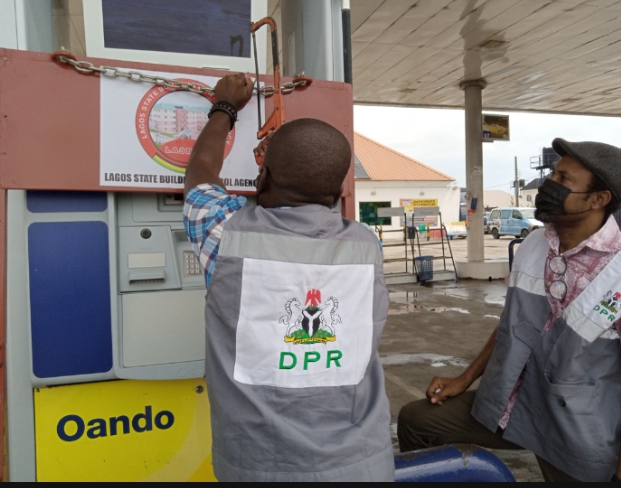The Department of Petroleum Resources (DPR) has reopened five filling stations shut by the Lagos State Building Control Agency ( LASBCA) in the Ajah and Ibeju Lekki axis of the state.
Mr Ayorinde Cardoso, Zonal Operations Controller, DPR, Lagos Zone, while reopening the stations on Thursday said the stations were sealed without consultation with the regulatory agency.
Read Also: Jonathan Performs First Function As Chancellor Of Cavendish University Uganda…
The News Agency of Nigeria (NAN) reports that the filling stations operated by the Major Oil Marketers Association of Nigeria (MOMAN) members were sealed by the building control agency.
Cardoso maintained that LASBCA lacked the constitutional power to shut petroleum products retail outlets because the industry was clearly under the Exclusive List.
He advised state and local government agencies to desist from arbitrary sealing of businesses in the oil and gas sector as it could lead to disruption in the supply of petroleum products.
Cardoso said: “We got information yesterday that LASBCA has shut down about 10 filling stations. We also learnt that a local government council shut down another petrol station in the Magodo area.
“We were not consulted and we need to put the record straight. Oil and gas business is a regulated environment and we know from the 1999 Constitution that oil and gas are matters within the exclusive legislative List.
“The Federal Government of Nigeria through the National Assembly is endowed with exclusive power to execute on any item on the exclusive list.”
He explained that “arising from that constitutional powers, the National Assembly enacted the Petroleum Act of 1969.
“This act regulates all matters relating to petroleum such as importation, handling, storage, distribution of petroleum and petroleum products and other flammable oils.
“This act also provides granting of license to import, handle, store, sell, distribute any petroleum product in Nigeria.”
He said as a result of this, all persons that engaged in the business were licensed by the Minister of Petroleum Resources through DPR.
According to him, the DPR collaborates with other relevant Federal and State Government agencies for requisite permits and approvals before the issuance of the licenses.
Cardoso said there were prerequisite processes that must be completed before license to operate is issued to any operator.
He said these included certificates of Incorporation, Memorandum, and Articles of Association, Tax Clearance Certificate, Police Report, Fire Report, Approved Building Plan, and letters from the Lands and Survey.
Cardoso said it also included the Environmental Impact Assessment Report, Site Layout Plan, Evidence of Land Ownership and Survey Plan.
“Once we have done this and we issue licence to operate, it becomes a federal government property for business and our licence gives the owner the permission to do business in that area.
“So, any issue arising from the licensee, you need to call on the licensor who is the federal government; then we will look at the issue and see how we can resolve it,” he said.
Cardoso said the DPR was interacting with the Lagos State Ministry of Energy and Mineral Resources to ensure that agencies of the state government did not disrupt the smooth supply of petroleum products in Lagos.
However, Mr Gbadeyan Abdulraheem, Public Relations Officer, LASBCA, told NAN that some of the sealed stations did not have the agency’s approval or had deviated from the approved plan.
“The DPR can give you the approval to run a filling station but the building itself has to be approved by LASBCA and there are conditions to be met which they didn’t.
“Some of them didn’t follow the radius which is a minimum of 300 meters before sitting another one while others were constructed between residential buildings.
“Lagos State government is not interested in victimising or creating problems for anybody. What we are saying is that they should follow the best practices,” Abdulrasheed said.




 Premier League
Premier League